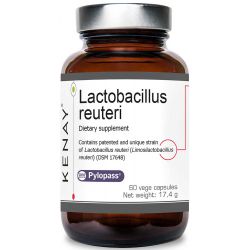
26,16 €
Science-based food supplements
Quantity:
Total:
Total products:
Total shipping: To be determined
Total:
Manufacturer: Kenay GmbH
In stock
| Quantity | Price | You Save |
|---|---|---|
| 2 | 10,23 € | Up to 0,85 € |
| 4 | 10,02 € | Up to 2,56 € |
By buying this product you can collect up to 10 loyalty points. Your cart will total 10 points that can be converted during next order into a voucher of 0,50 €.

Beta - carotene Provitamin A Lyc-O-Beta™
60 capsules
Item Catalog Number: K2738EN
Original product name: Beta - carotene Provitamin A Lyc-O-Beta™
Beta-carotene is a natural pigment (from the carotenoid group) found in most fruits and vegetables. It is beta-carotene that gives fruits and vegetables their intense yellow, orange and red color.
In the body, beta-carotene can be converted into vitamin A - that is why it is often called provitamin A.
Beta-carotene contained in our supplement: Lyc-O-Beta™ is 100% natural beta-carotene, produced by Blakeslea Trispora mold fungi. The special, patented beta-carotene production process used in Lyc-O-Beta™ allows you to obtain a GMO-free product, more stable and with much higher bioavailability.
Some studies shows that high concentrations of carotenoids in the skin usually occur in people who lead a calm, stress-free lifestyle and follows a diet rich in carotenoids or take carotenoid supplements.[1,4] Low concentrations of carotenoids have been observed in those, who lead an unhealthy lifestyle, use stimulants, suffer from chronic diseasesand and who don't eat properly.[1,4]
Beta-carotene is an extremely strong antioxidant. It protects the body against oxidative stress and strengthens immune functions, as well as protects the heart and circulatory system by preventing the oxidation and proliferation of low-density lipoproteins (LDL). Beta-carotene also protects eye health and supports skin health.
In the body, beta-carotene may be converted into vitamin A, and severe vitamin A deficiency leads to blindness.[5]
Oraly supplemented beta-carotene is an endogenous photoprotector, and its efficacy to prevent UV-induced erythema formation has been demonstrated in various studies.[13,22,23,24] As a powerful antioxidant which eliminates free radicals, beta-carotene may help maintain healthy, radiant skin.
Due to its antioxidant and protective properties, beta-carotene is commonly used as an ingredient of many skin-care cosmetics. In addition, it improves skin tone, supports hydration and has anti-wrinkle properties.
A diet rich in β-carotene protects the heart and the entire circulatory system.(4,14,19)
Some studies show that the effect of increased total carotenoid concentration in serum was a reduction in the thickness of the endothelium-media complex, which means a reduced risk of atherosclerosis.(15,16,19) Thickness of the endothelium-media complex (IMT, intima-media thickness) is a valuable indicator of the risk of a cardiovascular event. [17,18,19]
The antioxidant properties of beta-carotene may reduce the risk of heart disease and the entire circulatory system. Beta-carotene modifies the mechanisms of oxidation and peroxidation of low-density lipoproteins (LDL).[17.19] Beta-carotene also protects endothelial cells.
Moreover, beta-carotene in blood plasma effectively increases the bioavailability of nitrous oxide. Beta-carotene may also influence the regulation of genes involved in the metabolism of cholesterol, therefore the risk of atherosclerosis and cardiovascular diseases is significantly reduced (19,20,21).
Daily dose: 1 capsule
| Amount Per Day (1 capsule) | |
|---|---|
|
Natural beta-carotene extracted by fermentation of Blakeslea Trispora /Lyc-O-Beta™/ including: - provitamin A (2,667 IU) |
4,8 mg 800 µg |
|
Vitamin C (L-ascorbic acid) |
206 mg |
|
Ingredients: L-ascorbic acid (vitamin C); natural beta-carotene extracted by fermentation of Blakeslea Trispora; stabilizer: sodium alginate; thickener: gum arabic; pea starch; capsule shell ingredient: hydroxypropylmethylcellulose |
|
Product suitable for vegetarians (Vcaps® capsule)
Lyc-O-Beta™ is a registered brand of LycoRed.
Dosage and Use
Take one (1) capsule daily or as directed by your healthcare professional.
Storage: Store in a closed container at room temperature, out of the reach of small children
Attention:
This is a product of natural origin. Due to the natural ingredients used in production, there may be some variation in the color of the capsules.
Natural dyes and plant ingredients contained in this supplement may affect the shade of the capsules. Color changes do not in any way affect the effectiveness or quality of the product. All ingredients are carefully selected and tested to ensure full compliance with our standards.
Don't use vitamin A or beta-carotene supplements if you take any of these medicines (they contain derivatives of vitamin A): Isotretinoin, Acitretin, Etretinate. [5]
If you use cod liver oil, make sure your other supplements do not contain extra vitamin A.[7]
Warnings:
Before you start using any dietary supplement, consult your doctor.
Dietary supplements are not medicines.
Do not exceed the recommended daily dose.
Dietary supplements cannot be used as a substitute for a varied diet.
Do not use in case of hypersensitivity to any ingredient of the preparation.
The product should not be used by pregnant or breastfeeding women and children and adolescents under 18 years of age.